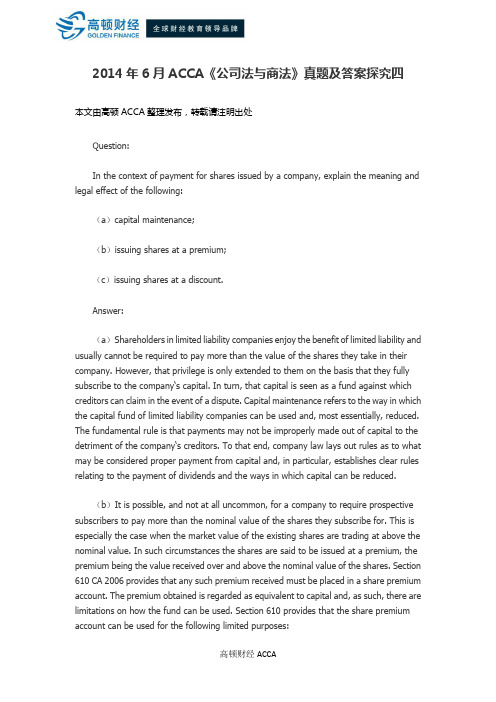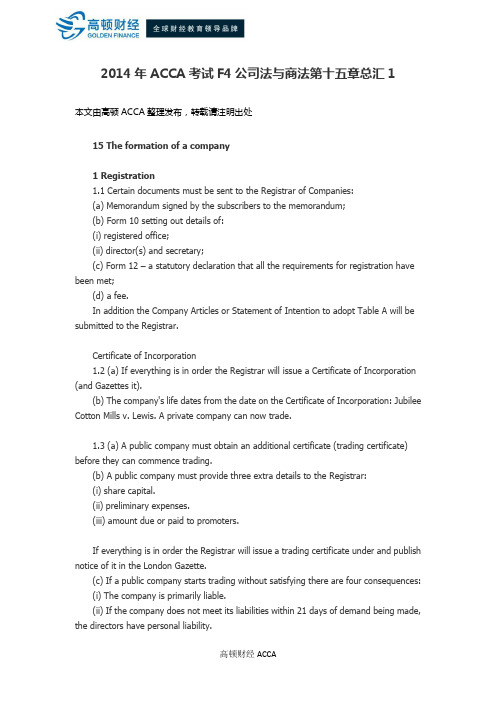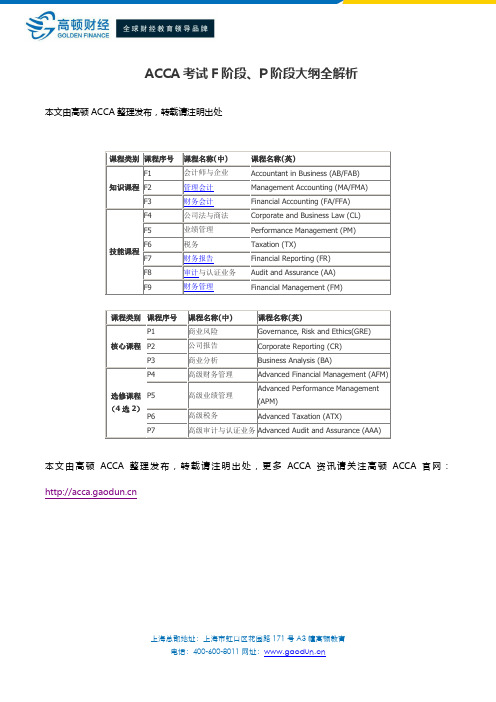2014年ACCA考试F4公司法与商法第二十章总汇1
2014年12月ACCA考试《F4公司法与商法》辅导要点十二

2014年12月ACCA考试《F4公司法与商法》辅导要点十二本文由高顿ACCA整理发布,转载请注明出处11 Discharge, breach of contract and remedies1 Discharge1.1 A contract can be discharged in a number of ways. The method of discharge may amount to a breach of contract and hence give rise to a claim for damages. However, there are other methods of discharging a contract that will not give rise to a breach of contract claim namely discharge by(a) Agreement(b) Performance.1.2 Agreement(a) Agreement means that both parties agree that the contract be discharged. Some contracts provide for discharge by agreement for example by expressly stating that the contract can be discharged by notice.Alternatively:(b) The contract can be discharged by a completely new agreement e.g. where one party agrees to accept a change in the other's performance (a 'variation' agreement). To be binding such agreements themselves must be supported by consideration.1.3 Performance(a) This is the most common way in which a contract is discharged. It is important that performance occurs as without it there will be a breach of contract. It would also be inequitable to allow one party to sue another for breach if he himself has not performed the terms of the contract exactly and completely. This is known as the rule in Cutter v Powell.(b) Sometimes the rule is Cutter v Powell can act harshly and hence some exceptions to the rule have developed for example where non-performance has been caused by the other party.1.4 Breach(a) Contracts can be discharged by fundamental breaches of contract.(b) Breach of condition:(i) Straightforward breach is easy enough to understand. One or both parties are not complying with the conditions of the contract. Remember the injured party may only bring the contract to an end if there has been a breach of condition.(ii) Anticipatory breach is where one party indicates that he does not intend to complete his part of the contract. The innocent party (the claimant) can sue on notice.But claimant can elect to ignore the breach, complete his part of the contract and then sue: White and Carter (Councils) Ltd v McGregorIf the claimant so elects he must complete his part properly or he himself will be liable for breach.Actions for anticipatory breach should be started at once otherwise factors may intervene which mean the contract is automatically discharged (e.g. on outbreak of war that would render the contract illegal).更多ACCA资讯请关注高顿ACCA官网:。
2014年6月ACCA《公司法与商法》真题及答案探究四

2014年6月ACCA《公司法与商法》真题及答案探究四本文由高顿ACCA整理发布,转载请注明出处Question:In the context of payment for shares issued by a company, explain the meaning and legal effect of the following:(a)capital maintenance;(b)issuing shares at a premium;(c)issuing shares at a discount.Answer:(a)Shareholders in limited liability companies enjoy the benefit of limited liability and usually cannot be required to pay more than the value of the shares they take in their company. However, that privilege is only extended to them on the basis that they fully subscribe to the company‘s capital. In turn, that capital is seen as a fund against which creditors can claim in the event of a dispute. Capital maintenance refers to the way in which the capital fund of limited liability companies can be used and, most essentially, reduced. The fundamental rule is that payments may not be improperly made out of capital to the detriment of the company‘s creditors. To that end, company law lays out rules as to what may be considered proper payment from capital and, in particular, establishes clear rules relating to the payment of dividends and the ways in which capital can be reduced.(b)It is possible, and not at all uncommon, for a company to require prospective subscribers to pay more than the nominal value of the shares they subscribe for. This is especially the case when the market value of the existing shares are trading at above the nominal value. In such circumstances the shares are said to be issued at a premium, the premium being the value received over and above the nominal value of the shares. Section 610 CA 2006 provides that any such premium received must be placed in a share premium account. The premium obtained is regarded as equivalent to capital and, as such, there are limitations on how the fund can be used. Section 610 provides that the share premium account can be used for the following limited purposes:更多ACCA资讯请关注高顿ACCA官网:。
ACCAF4公司法与商法题库.doc

Special resolution
正确答案:
Special resolution
问题22
Which of the followi ng is the n ame given to compa nies that are created by directors of in solve nt companies in order to continue their business illegally?
问题1
Which of the following must be proved to win a case of fraudule nt trading un der the In solve ncy Act 1986?
所选答案:The fraud wasintended正确答案:
The fraud was intended
问题2
Which of the following parties has their interest paid last out of a liquidated company's assets?所选答案:
Members
正确答案:
Members
问题3
At which point before its payme nt does a divide nd become a debt of the compa ny?
21
止确答案:
21
问题25
Which of the following statements concerning wrongful trading is correct?
所选答案:
A case of wrongful trading is brought by a company's liquidator
2014年ACCA考试F4公司法与商法第二十一章总汇1

2014年ACCA考试F4公司法与商法第二十一章总汇1本文由高顿ACCA整理发布,转载请注明出处21 Minorities1 Case lawFoss v. Harbottle: the internal management rule1.1 (a) 'The proper plaintiff for wrongs done to a company is the company itself acting through its majority shareholders'.(b) Thus decisions made or ratified by the majority cannot be disputed by the minority.Exceptions1.2 There are a number of apparent exceptions where an individual member may bring an action on behalf of the company (a 'derivative' action).(a) a minority shareholder, can obtain an injunction to prevent a proposed act by the directors which would be ultra vires the company. This will not apply where the contract has already been agreed or ratified by a SR; Parke v Daily News.(b) a minority shareholder can obtain an injunction to prevent the directors from allowing the company to commit a criminal offence;(c) the court will grant a remedy if the directors in breach of their duties to the company have committed a 'fraud on the minority' e.g. where directors have used their powers dishonestly to benefit themselves at the expense of the company: Cook v Deeks.Dishonest intention is not necessary gross negligence will be enough: Daniels v Daniels, but note Pavlides v Jensen.1.3 Where the wrong is to a member personally shareholders have the right to sue to uphold their rights: Pender v Lushington.更多ACCA资讯请关注高顿ACCA官网:。
ACCA《F4公司法与商法》精选讲义第一章(1)

ACCA《F4公司法与商法》精选讲义第一章(1)本文由高顿ACCA整理发布,转载请注明出处Session 1 The Nature, Source and Purpose of Management AccountingMain contents:1. Data and information2. The managerial processes of planning, decision making and control3. Responsibility accounting4. Management accounting and financing accounting5. Presentation of management information1.1 Data and Information· Data consists of raw materials, which include numbers, letters, symbols, facts, events and transactions, that have been recorded but not yet processed into a form suitable for use.· Information is data which has been processed in such a way that it is meaningful to the person to the person who receives it. (for decision making purpose)The attributes of good information can be identified by the “ACCURATE” as shown below:· Accurate: accurate enough for the purpose· Complete: all the necessary information· Cost- effective: benefit > costs· Understandable: clear and easy to understand· Relevant: relevant to purpose· Accessible: the best way to communicate with the related person· Timely: be available at the right time· Easy to use: by management1.2 The Managerial Process of Planning , Decision Making and ControlInformation for management is likely to be used for planning, control and decision making objectives:An objective is the aim or goal of an organization. A strategy is a possible course of action that might enable an organization or an individual to achieve its objective.Planning:· Planning involved the following two factors:Establishing the objectivesSelecting appropriate strategy to achieve those objectives· The link between structure and strategy (understanding)1)。
2014年ACCA考试F4公司法与商法第十五章总汇1

2014年ACCA考试F4公司法与商法第十五章总汇1本文由高顿ACCA整理发布,转载请注明出处15 The formation of a company1 Registration1.1 Certain documents must be sent to the Registrar of Companies:(a) Memorandum signed by the subscribers to the memorandum;(b) Form 10 setting out details of:(i) registered office;(ii) director(s) and secretary;(c) Form 12 – a statutory declaration that all the requirements for registration have been met;(d) a fee.In addition the Company Articles or Statement of Intention to adopt Table A will be submitted to the Registrar.Certificate of Incorporation1.2 (a) If everything is in order the Registrar will issue a Certificate of Incorporation (and Gazettes it).(b) The company's life dates from the date on the Certificate of Incorporation: Jubilee Cotton Mills v. Lewis. A private company can now trade.1.3 (a) A public company must obtain an additional certificate (trading certificate) before they can commence trading.(b) A public company must provide three extra details to the Registrar:(i) share capital.(ii) preliminary expenses.(iii) amount due or paid to promoters.If everything is in order the Registrar will issue a trading certificate under and publish notice of it in the London Gazette.(c) If a public company starts trading without satisfying there are four consequences:(i) The company is primarily liable.(ii) If the company does not meet its liabilities within 21 days of demand being made, the directors have personal liability.(iii) The company and its officers are liable to a fine.(iv) If a certificate is not obtained within one year of incorporation it is grounds for winding?更多ACCA资讯请关注高顿ACCA官网:。
ACCA考试F阶段、P阶段大纲全解析

本文由高顿ACCA整理发布,转载请注明出处
课程类别
课程序号
课程名称(中)
课程名称(英)
知识课程
F1
会计师与企业
Accountant in Business (AB/FAB)
F2
管理会计
Management Accounting (MA/FMA)
F3
财务会计
Financial Accounting (FA/FFA)
本文由高顿ACCA整理发布,转载请注明出处,更多ACCA资讯请关注高顿ACCA官网:
选修课程
(4选2)
P4
高级财务管理
Advanced Financial Management (AFM)
P5
高级业绩管理
Advanced Performance Management (APM)
P6
高级税务
Advanced Taxation (ATX)
P7
高级审计与认证业务
Advanced Audit and Assurance (AAA)
技能课程
F4
公司法与商法
Corporate and Business Law (CL)
F5
业绩管理
Performance Management (PM)
F6
税务
Taxation (TX)
F7
财务报告
Financial Reporting (FR)
F8
审计与认证业务
Audit and Assurance (AA)
F9
财务管理
Financial Management (FM)
课程类别
课程序号
课程名称(中)
ACCA《F4公司法与商法》辅导讲义(19)

2014年ACCA《F4公司法与商法》辅导讲义(19)本文由高顿ACCA整理发布,转载请注明出处2014年ACCA《F4公司法与商法》辅导讲义(19)1 Introduction1.1 “Insider dealing is understood broadly to cover situations where a person buys or sells securities, when he, but not the other party to the transaction, is in possession of confidential information which affects the value of those securities ….” (The Conduct of Company Directors 1977).1.2 Insider dealing usually applies to individuals who have a connection with the company whose securities are to be dealt in eg. directors, employees, professional advisors but can also apply to a wide range of other individuals.1.3 An example would be the company director who, aware that his company is about to announce far better interim results than predicted, buys shares in his company before the announcement.2 The Criminal Justice Act 19932.1 The Act came into force in 1994 and replaced the old Companies Securities (Insider Dealing) Act of 1985. The 1993 Act reflects the European Insider Dealing Directive which harmonises Insider Dealing law throughout the European Union.2.2 The Act makes insider dealing a criminal offence.3 The offence3.1 The Defendant was an InsiderAn insider is defined as:(a) a director, employee or shareholder of the issuer of the securities(b) anyone else who has access to the information through his employment, office or profession(c) anyone who obtains information (directly or indirectly) from either of the above.The …insider‟ must be aware that the information comes from an inside source and that it is inside information.3.2 The Defendant had Inside InformationInside information is information which is …price sensitive‟, that is which:(a) has not yet been made public(b) if it was made public would be likely to have a significant effect on the price of any securities(c) is specific or precise (e.g. … … a take-over bid is about to be announced for X plc …‟ is specific, whereas a mere tip …buy X plc‟ would not be)(d) relates to particular securities or a particular issuer rather than to securities or issues generally. (In other words, information which suggests it is a good idea to sell X plc securities can be inside information but not information which would persuade the market to move out of equities generally and into gilts).3.3 The Defendant either:(a) deals (buys or sells relevant securities) or(b) encourages another person to deal, or(c) discloses the information (except in the proper performance of the functions of his employment, office or profession).3.4 The Securities involved are:Shares, debt securities, warrants, options, futures, depository receipts and contracts for differences dealt either on-exchange or off-exchange through a professional intermediary.4 Defences4.1 The Defences are that:(a) there was no expectation that the dealing would result in a profit or avoidance of loss.(b) reasonable belief that the information had been widely disclosed.(c) they would have dealt anyway even if the information had not been available.(d) they did not expect the person to whom they disclosed the information to deal, or they did expect them to deal, but not to make a profit or avoid a loss.(e) a Market Maker acting in good faith.(f) legitimate price stabilisation operations.5 Penalties5.1 On summary conviction a fine of up to ?5,000 and/or 6 months' imprisonment.5.2 On indictment an unlimited fine and/or 7 years imprisonment.NB: Contracts with third parties remain valid and enforceable at civil law.6 Prosecution6.1 Prosecutions are normally carried out by(a) LSE(b) DTI(c) Serious Fraud Office (SFO)6.2 As insider dealing is a criminal offence the standard of proof (beyond all reasonable doubt) is higher than for civil offences (balance of probabilities). It is therefore difficult to obtain a successful prosecution.更多ACCA资讯请关注高顿ACCA官网:。
